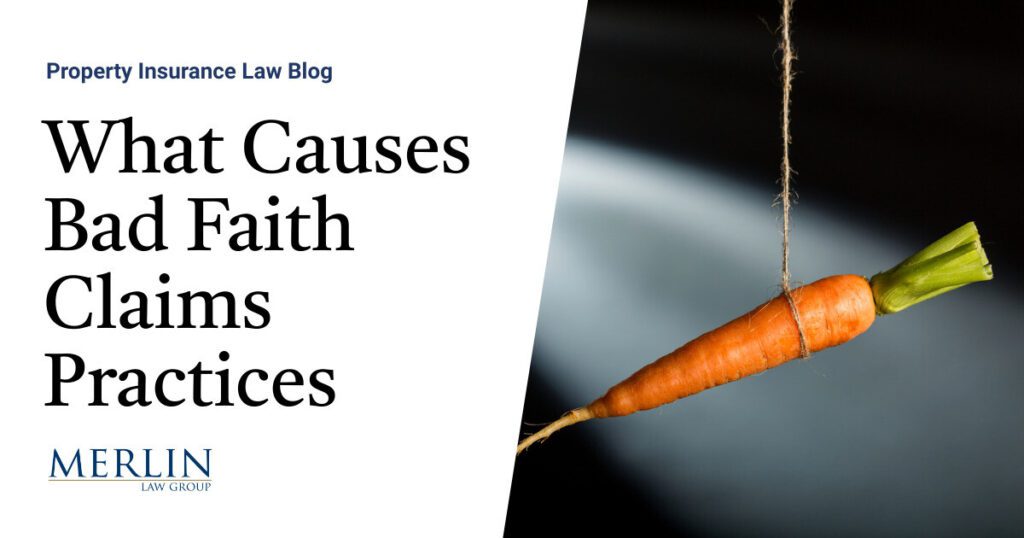What Causes Bad Faith Claims Practices? One Reason Is Financial Incentives and Goals

Insurance company employer goals, which are supported by financial bonus and incentive programs to claims managers and adjusters, can cause insurance companies to fail in their ethical claims obligations to their customers.
As noted in an often quoted article about this topic which is worthy of fully reading, Slouching to Gomorrah: Adjuster Pay Plans and Bad Faith, by insurance claims expert Kevin Quinley: 1
“The adjuster’s job is not to turn a profit for the company, to advance the company’s A.M. Best rating, or to max out on the incentive compensation plan. Once these factors seep into the adjuster’s consciousness at the file-handling level, mischief creeps in. Dysfunctional incentives drive suspect claims practices.”
I quoted insurance claims expert Robert Dietz in What Are the Good Faith Claims Handling Rules Insurance Companies Must Follow? Adjusters Must Do These or Be Guilty of Bad Faith. He stated the various “rules of the road” which insurance claims adjusters and managers must follow to do their jobs properly and act in good faith. In another affidavit, he stated the following:
I have studied the policies, procedures, claims manuals, and training materials of all of the large insurance companies, and those of smaller ones as well. During the course of doing so, I have reviewed dozens of insurer bonus and compensation programs for claims adjusters.
In my work as an expert, I have been involved in scores and scores of cases addressing the insurer’s pay scheme and determining whether the bonus compensation or incentive program complies with industry standards.
As stated above, I have also put on trainings for lawyers and peers related to the insurer employer bonus/incentive program and how such programs could run afoul to the insurance company’s obligations to their policyholders. As I stated in my report, in short, bonuses that are based on company profits can be an undue influence on claims making decisions. Simply put, the less paid out in claims means more profit and higher bonuses, allowing for a conflict of interest.
I have also testified a number of times regarding whether an insurer’s bonus program complies with industry standards, and why. Part of the ‘why’ is explaining how the program can influence claims handling conduct and claims decisions. I have and continue to testify in many depositions and trial courts on these topics. The majority of my one hundred plus depositions have encompassed my opinions on adjuster pay schemes.
…
I have also worked with regulators conducting Market Conduct Examinations on the subject. There is, and has been for decades, significant literature in the insurance industry about how it is improper for insurers to maintain profit-based compensation incentives programs like CIG’s….
As an expert with 35 years in the landscape of insurance claims, I also rely on the experience and accumulated knowledge and study on incentive pay and bonus schemes, as well as the decisions of the fact finders. Most insurers have some guidance or procedures regarding its Code of Ethics. In them, claims staff are admonished to not accept any gift or gratuity beyond a token. This is to avoid undue influence in making claims decisions. This same concern comes into play with these hidden and difficult to obtain documents related to insurer compensation programs, such as those CIG has produced here under a protective. In my opinion, they are absolutely probative in understanding WHY alleged bad behavior occurred here.
Based on my decades of experience in the claims-handling industry and on the literature mentioned above, my opinion is that claims department incentives and bonus programs like CIG’s work to drive expected outcomes. Otherwise they would not exist. The conflict of interest inherent in tying adjuster financial gain to the company’s profit creates an environment in which claims adjusters have a direct opportunity to influence their compensation by maintaining or increasing company profit.
I often am asked by policyholders, public adjusters, and restoration contractors why insurance companies seem to be taking a much harder stance about paying promptly and fully as noted in The Bad Faith Claim Practice Scheme of Attrition—Delay and Make Them Sue to Get Full Payment. It does not take a financial genius to figure out that it is far more profitable to take people’s premium money, promising superb claims service with advertising of full and prompt claims payments, and then not do so when claims are presented. One management technique to support this scheme is to provide incentive-based programs to the claims officers and managers who devise these crazy schemes and then force them upon the lower level field adjusters.
For those interested in this topic, I would suggest reading Thoughts On Claims Incentive Goals—Where Is the Goal To Not Overlook All Damages, and the sources cited in that article.
Thought For The Day
It is difficult to get a man to understand something when his salary depends upon his not understanding it.
—Upton Sinclair
1 Kevin Quinley, Slouching to Gomorrah: Adjuster Pay Plans and Bad Faith, CLAIMS magazine, October 2004 (Updated Jan. 16, 2006).


